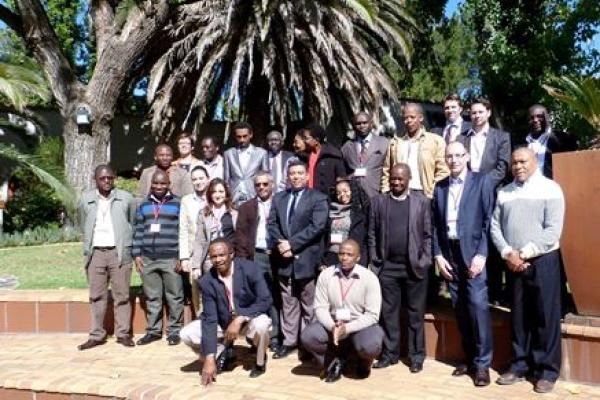Regional Workshop: Tracking Mitigation Actions in Africa
On invitation of the South African Department of Environmental Affairs (DEA), the GIZ in South Africa and the International Partnership on Mitigation and MRV, eight African countries (Egypt, Ethiopia, Ghana, Kenya, Mali, Tunisia, South Africa, Zambia) gathered for a peer-to-peer exchange from 7–9 May in Magaliesberg, South Africa. The distinguished country representatives presented the strengths and challenges of their national reporting systems and shared their experiences.
The main objectives of the workshop were to:
- present on-going mitigation actions in different African countries;
- provide an up-to-date self-assessment of GHG inventories in different African countries;
- identify existing information and support needs to respond to the enhanced reporting requirements of the UNFCCC.
All participating countries are currently in the process of developing an institutional framework for preparing their Biennial Update Reports and National Communications (including GHG inventories), and for collecting and analysing data to plan, report on and register their NAMAs. The participants collaborated in working groups to identify the challenges they need to work on in their individual countries as well as other countries that might already have relevant good practices in place.
Summary of conclusions
The discussion’s key focus was the institutionalisation of and procedures involved in national MRV systems. The presentations on the individual countries’ systems showed that they had both similar and different elements. It turned out that all MRV systems build on existing monitoring & evaluation arrangements and are therefore somewhat path-dependent. Thus the participants concluded that national MRV systems cannot simply be copied from one country and reproduced in another one. However, mutual learning from one another is possible and helps to identify certain steps in developing a national MRV system and certain institutional requirements all MRV systems must fulfil. Thus, all countries need to institutionalise structures, define procedures and methodologies, and train the staff on these procedures and methodologies within the institutional framework. All participants also agreed on the importance of leadership and establishing a champion for the design and introduction phase of the MRV system in order to make it operational. In many countries, some form of inter-ministerial committee is supposed to take on this leadership role. While establishing MRV systems requires sufficient resources and capacity – and eventually capacity building and training – minimising costs becomes increasingly relevant over the long term. In addition, nearly all countries had a national strategy or plan for low carbon development in place in which the national MRV system is embedded.
During exchanges among the countries, participants also agreed that international standards for MRV would be desirable and helpful and discussed the minimum standards that MRV systems should include. The discussion clearly showed that the ambitions of the participating countries significantly exceed what is currently under negotiation.
At the end of the workshop, the eight countries expressed their strong desire to continue collaborating in this group and agreed on certain joint activities and who should be in charge of organising next steps. Inspired by the exchanges with the other countries, the participants individually defined next steps to work on in their countries and how they plan to act more visibly in international fora in the future.


